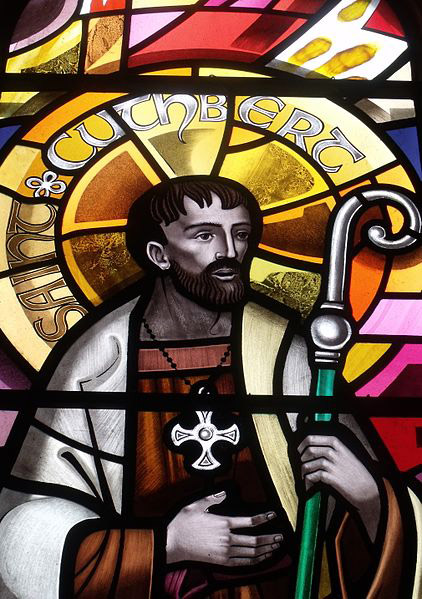(Image above: St Cuthbert. Credit – Andy V Byers)
Anthony McCarthy takes us back in time to reveal that environmentalism is nothing new.
It is sometimes said that environmentalism began in 1922 with the American Izaac Walton League. The aim of the latter was to protect natural resources for recreation (i.e. fishing) and public enjoyment. The founders quickly realised that there were more urgent reasons for protecting the environment: this led them to lobby for, and achieve, the Clean Water Act of 1972. The above was a significant step in the development of environmentalism but, actually, concern for nature goes back centuries.
 St Cuthbert. Credit – Andy V Byers
St Cuthbert. Credit – Andy V Byers
In the year 676, the (future) St. Cuthbert published rules governing the protection of birds on the Island of Lindisfarne. This was not just for the sake of the birds themselves but also because Cuthbert could see that harm to a part of the natural order is ultimately harm to the whole. In the year 1272, Edward I of England promulgated legislation which can only be seen as truly environmental: he passed an act that forbade the combustion of sea coal. The latter was a real attempt to clean up the air in crowded towns and cities.
The medieval period saw the advent of crop rotation, whereby in a three-field system one field was left fallow for a season. This is clearly an indication that the farmers of the time knew the importance of soil management and land conservation. Nature, especially land, developed into the basic source of value. Philosopher John Locke (1632-1704) came up with his labour theory of value based on working the land. He felt that if a person came upon unadopted land and worked on it to improve it, then that expenditure of labour and that land improved gave that person the right to say that the land had become his own. From the ethical ecology point of view Locke actually went further than this: he had a couple of caveats to his labour value theory. He said that the land improvement had to be of benefit to the wider community. He added that the land improver was morally bound to take only as much land as he needed for reasonable subsistence: the land was for everyone. The latter is a lesson that later industrialists forgot.
From the sciences came Charles Darwin (1809 –1882) and especially his famous work ‘On the Origin of Species’ (1859). Darwin makes plain that Man is an animal and has evolved through the natural order to become, by chance, the dominant species. Man has no divine right to control nature; he is a product of nature.
Aldo Leopold (1887-1948) gave rise to a philosophical perception of ecology. He originated the concept of ‘Land Ethic’. This meant that Man was no longer seen as the most important thing in nature but merely a part of it. All natural things became part of a ‘biotic community’. Human ethics is a measure against how well (or otherwise) Man treats his natural surroundings. The philosophic interest in the environment became more systematised in the 20th century. An example is the work of Lynn Townsend White (1907-1987). White saw Christianity as the main cause of man’s exploitation and abuse of the natural environment. White claimed that the Bible gave early Christians the idea that God had created nature for the use of Man. He called this idea ‘arrogance’ and felt that industrialists were using the notion of ‘God’s intention’ to unleash their technologies upon the natural world.
This idea was taken further by law professor Christopher Stone. In 1972, Stone advocated that objects of nature should be protected for their own sakes: he wanted the law of corporations to be extended to places of natural beauty (e.g. ancient woods). In effect, this was a case of legal rights for natural things. In his day, Stone was trying to stop urban development from encroaching into the green belt; nowadays, we would quote the illegal logging in the Amazon rainforests: the destruction of nature to make a few people rich.
So, what is the legacy of all this philosophical musing about Man and nature? We do have strong lobbies from Green Parties in Europe. That much is true. However they lobby, they do not have actual power in any modern democracy. Modern UK governments are aware that the finance for their parties comes from big business. Corporations want profits and, since they run the political parties, legislation tends to go in their favour. We need a mindset in which we all realize that the capitalist cycle of buy, use, dispose, buy another, is the main cause of environmental degradation. Corporations will pay lip service but do little. They do not wish to threaten their income. They do not wish to lose shareholders. Can we really hope that a Scandinavian teenager glaring at the President of the United States is going to bring about this mindset revolution? I think not.
Anthony McCarthy is a PIPS (Philosophy In Pubs) member and a WEA tutor.

